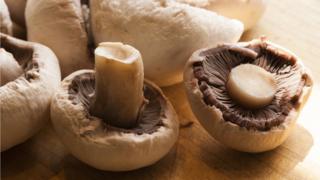 Image copyright
Image copyrightGetty Images
Try microwaving your mushrooms to preserve the nutrients they contain, a study says
The healthiest way to cook mushrooms is to microwave or grill them to preserve their goodness, researchers say.
These cooking methods significantly increase levels of antioxidants which protect cells against diseases, but boiling or frying reduces them.
A study, from Spain, looked at the properties of four different types of mushrooms before and after cooking.
Adding a little oil when grilling can even improve the nutritional value of the mushrooms.
What's in a mushroom?
Plenty, it turns out. They contain protein, including essential amino acids, fibre and lots of vitamins - such as B, C , D and E.
They are also low in calories and fat.
In this study, published in the International Journal of Food Sciences and Nutrition, researchers analysed how cooking methods altered white button, shiitake, oyster and king oyster mushrooms.
What's the problem with frying mushrooms?
Frying resulted in protein and carbohydrates being lost from the mushrooms, as well as antioxidant compounds.
Antioxidants are vitamins and chemicals that play a key role in protecting the body against free radicals, which are linked to heart disease, cancer and other diseases.
What happens is that they disappear into the oil in the frying pan, reducing the goodness of the mushrooms.
So losing them isn't great news.
But, on the other hand, fried mushrooms do taste great with onions and garlic.
Image copyright
Getty Images
Health-giving antioxidants increase when mushrooms are grilled in a little oil
And boiling?
Boiling mushrooms also led to high levels of proteins and antioxidants being lost from the fungi.
The researchers put this down to the good stuff leaking out of the mushrooms into the water in the pan.
As a result, their nutritional value was reduced.
However, boiling did improve the glucans content of the mushrooms. They are found in fungi and may reduce the risk of heart disease.
- BBC iWonder - Are antioxidants the magic bullet?
What's so good about microwaving?
The best way to retain vitamins and nutrients when cooking vegetables is to use short cooking times.
It's also best to use as little liquid as possible.
This means using a microwave is a good method of cooking because fewer of the good things are lost - unlike boiling where they end up in the cooking water.
In this study, the researcher Irene Roncero-Ramos, from the Mushroom Technological Research Center of La Rioja, said: "When mushrooms were cooked by microwave or grill, the content of polyphenol and antioxidant activity increased significantly and there are no significant issues in nutritional value of the cooked mushrooms."
Image copyright
Getty Images
Why is grilling with oil a good move?
Even though cooking in oil can cause nutrients to be lost, mushrooms grilled in a small amount of oil increased their antioxidant properties.
And when olive oil was used, fatty acids increased without any rise in calorie content, the researchers said.
So should we all be eating more antioxidants?
Research from the past 10 years or so shows that eating antioxidant-rich foods can benefit our general health.
They are vitamins, minerals and other chemicals that help protect our cells - and are found in lots of different types of food, such as fruit, vegetables, nuts, pulses and fish.
But they aren't the answer to everything.
A healthy, balanced diet containing a wide variety of foods in the right proportions is recommended.
According to NHS Choices, fruit and vegetables are a vital source of vitamins and minerals and should make up just over a third of the food we eat each day.
That's because fruit and vegetables can help lower the risk of health issues such as high blood pressure, obesity and some cancers.

Comments
Post a Comment